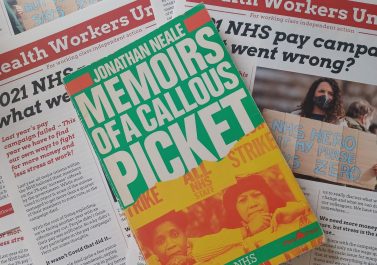Review written by a comrade of the ‘Let’s get rooted’-network in Bristol
Tracksuits, Traumas and Class Traitors comes as Hunter’s second book, following the explosion of popularity that came from his debut Chav Solidarity. For those unfamiliar, Chav Solidarity was a collection of essays written by Hunter at a time of reflection on his experience of the UK political Left, bringing out a deep frustration with the way in which the radical milieu engaged with, infantilised and dismissed people from his social background.
Hunter uses the term “Poor and working class”, to describe these people. There aren’t really clear demarcations of who is and isn’t included in this category, but generally, they tend to be people in a lineage of exclusion from social production. They tend to be folks engaged in informal economies (drugs, sex work, gambling etc) as a primary means of survival and so-called “criminality” as another. These people are the “marginalised proletariat”, separated from ownership of the means of production and largely prevented from accessing the means of production in any meaningful way. In Tracksuits, Traumas and Class Traitors Hunter quite comprehensively explores the ways in which this social class has been created through the violent discipline of capitalist society and the state’s need to divide the working class, the brutal legacies of colonialism and imperialism that bring out oppressions such as racism and xenophobia, and the stringent order of hetero-patriarchal domination that lead to deeply ingrained ideologies of oppression recognised in the forms of sexism, homophobia and transphobia.
Tracksuits, Traumas and Class Traitors is in some parts a clarifying of Hunter’s critique, others an expansion and all the way through a fierce rejection of the reductive ways in which Chav Solidarity was often received. Hunter carefully lays out his rejection of the ways there has been a tendency to place the characters introduced in his reflections on his experiences into a strict binary, (good vs bad, abuser vs abused, class traitor vs class hero) and encourages readers to break out of the homogenising bourgeois, liberal paradigms that create such a lack of fluidity of understanding. For instance in his portrayal if his grandad, who in one reading appears solely as an abusive, destructive and malicious bastard, Hunter draws attention to the ways in which the trauma inflicted on him by his grandad was in a way inherited from trauma inflicted upon himself generationally. Hunter delicately makes no excuse for his grandad’s actions, but explains his beliefs about why he did them, analysing the material conditions of the section of the class that they fell in and the pressures and violence of the state. What Hunter does is a fantastic process of using his candid personal experience to track the ways and examples in which the state enforces violence onto workers, and violence between workers, in a way which benefit capitalism and structures of oppression. Not only this, but Hunter digs into the ways that we reproduce these structures of exploitation and oppression within ourselves, and importantly in the social formations we voluntarily create.
In the introduction, Hunter outlines the four main methodological frameworks for analysis that he uses throughout the book: auto/ethnography, class analysis, carceral abolition and queer methodologies. This sets the this work apart from Chav Solidarity in a number of ways, and is fundamental to understanding why this book is in many ways an even more essential read than Chav Solidarity. Whist the former is gripping and engaging, full of insight and proposals to self-proclaimed radicals of all stripes, Tracksuits, Traumas and Class Traitors elevates and focuses the importance of the arguments. These methodologies, and conscious application of them, are what creates a drastic wedge between this book and other similar texts that tend towards a flimsy sociological content focusing on various “identities” as primary political drivers.
Hunter avoids this by always keeping a clear focus on the materiality of the section of the social class in question. Whilst there is definitely discussion of “identities” within the ten essays contained in the book, Hunter always draws a line back to the material conditions that these “identities” are formed from and he often finds them in the forms of the capitalist mode of production and intense state violence implemented in order to perpetuate it.
As revolutionaries, people who want to see this whole shit-pile of a system torn down with all its exploitations and oppressions, how can we understand the position and role of the marginalised proletariat in our movements? What experiences, knowledge and organic social formations can we learn from, follow and deepen within this section of our class? What aspects of our engagement and relationships with our comrades, families, friends and dependants do we need to reimagine, rework or potentially leave behind us in order to build the cohesion and dynamism that’s necessary in our struggles?
Having met Hunter and following his work for a while, I think it would be fair to say that he’d be the first to say that he doesn’t have all the answers, but what he has done here is a colossal first step. Tracksuits, Traumas and Class Traitors is an extremely timely, and radical intervention into abolitionist thought, in particular. The retrospective engagement within this auto/ethnographical text with the possibilities of harm reduction in his past, were they approached with a practice of transformative justice provide an insight and almost tangible possibility for greater unity and conscious solidarity within the working-class. This possible unity and solidarity is going be fundamental if we ever have a hope of building the new world that is not just possible, but necessary.
We then find some questions that grow out of this analysis of the current state of the social class that we have termed the marginalised proletariat here. Some of the answers may begin in the final essay “Class Traitors”, but we would like to see more developed answers forming out of engagement with the book, and not fall on the shoulders necessarily of Hunter himself to bring about. We understand that Hunter continually points to methods of radical departure from carceral and retributive logic in order to begin to heal the multi-generational effects of trauma and state violence. We also see throughout the book that Hunter often points to the impossibility (or at least extreme difficulty) in initiating this process within the current formations of social (re-)production. How can we meaningfully engage with this process of radical healing under the confines of highly disciplinarian wage labour? How can we create space for the kind of process needed in a society where the family unit is entrenched and enforced as the sole reproductive agent of capitalist society? Where is the role of the militant worker in strengthening the actions of those who primarily engage in carceral abolitionism as a form of revolutionary organising, and what solidarities can be forged within this relationship? Perhaps the most important strategical question on our minds is how do we demonstrate to the marginalised proletariat our shared interest in the socialisation of production whilst the marginalised proletariat demonstrates the importance and methods of resistance to structural coercion and organic mutual-aid systems Hunter identifies, to the industrial proletariat?
What’s clear is that there is potential, alongside a burning necessity, to consider the radical transformations to the material conditions of society we need to thrive, as well as our approach and practice in pursuing those changes. Tracksuits, Traumas and Class Traitors is a brilliant, and important intervention into the conversation for the revolutionary milieu in the UK, but these questions can only be answered in continual experimentation and practice as well as ongoing dialogue between all of us who fight for a better world. This book, I imagine, will be another “must-read” from Hunter and I would say that such a label is deserved. The question then, is what we do with it after we’ve all read it.



